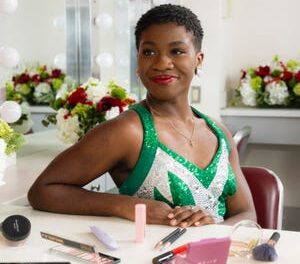The great Jodi Mitchell once wrote, “You don’t know what you’ve got ‘til it’s gone,” which certainly applied to acting in 2023. Of course, actors didn’t disappear this year. They were just far less visible for a while. The SAG strike — lasting from mid-July to early November — was an eye-opening necessity, protecting the guild from the studios’ ghastly attempts to implement artificial intelligence and correcting issues like lost wages and residuals that stemmed from the “great” streaming disruption.
But if you would’ve told me a year ago I’d be lamenting the loss of all those red carpets, publicity junkets, and various press appearances actors bravely embark upon for their art, I would’ve laughed in your face — and then I would have apologized for laughing in your face, and explained, slowly and assuredly, that “No, I would never miss the scourge of half-formed quotes and overanalyzed gestures that flood our social media feeds every time a new movie or TV show is about to premiere.” As long as actors are acting — on the stage, in indie movies (with those precious SAG waivers), and via the already-wrapped productions that were still being released — we’d all be fine.
Well, to no one’s surprise but mine, I was wrong. Yes, 2023 still gave us a dozens and dozens of remarkable performances. As a culture, we were still able to appreciate the craft of these fine thespians, while discussing among ourselves who had us rolling in the aisles, who left us in tears, and why they were just so damn good at evoking such strong responses. The Emmys have (and the Oscars will have) a stacked lineup of acting nominees, all of whom will be asked about all their most challenging scenes, surprising choices, and ostentatious physical transformations. (“That accent!” “That nose!”)
But what I realized during those quiet months in which actors couldn’t discuss their work was how crucial their voices are to the conversation. Great performances are worth savoring, and one of the most reliable ways to do that — in today’s day and age of binge-viewing and disappearing movies — is to be reminded of the movie, of the show, of the role, of the scene, of the moments big and small, by the onslaught of attention the performance itself demands. Who better to do the reminding than the performer themself? (Ideally alongside the writers, who we also missed.) So we here at IndieWire have come up with our list of the best performances of 2023, across film and television, in order to help out. Lists are incredible resources. They can inform and excite, spark ideas and, yes, serve as crucial reminders. We may not be actors, but we love actors, we love movies, and we love TV. We love every part of it, even the parts we thought we didn’t. So let’s get to the good stuff: Below, an unranked list of the 30 best performances of the year.
Christian Blauvelt, Kate Erbland, Alison Foreman, Marcus Jones, Ryan Lattanzio, Mark Peikert, Sarah Shachat, Erin Strecker, and Christian Zilko contributed to this article.
-
1. Clark Backo, “The Changeling”

Image Credit: Courtesy of Christos Kalohoridis / Apple TV+ When “The Changeling” auteurs Kelly Marcel and Melina Matsoukas set out to adapt Victor LaValle’s 2017 fantasy horror novel, they wanted to cast someone relatively unknown in the role of Emma. And yet, even with that explicit goal in mind, it’s hard to imagine magic didn’t play a part in finding Clark Backo.
The miraculously ethereal yet tenacious actress previously appeared in the Canadian sitcom “Letterkenny” and in the Prime Video original movie “I Want You Back.” She’s instantly likable in those projects and this one: an infectiously charismatic love interest practically destined to appear opposite the winsome, uncertain charms of someone like LaKeith Stanfield. But the gnarled journey of “The Changeling” — which tells the terrifying story of a New York City couple whose infant son is swapped for a demonic creature of folklore — required Backo to progress her performance through three dazzling and distinct stages.
We first meet Emma as woman, wife, and mother: a fairytale archetype fully realized in Backo’s dripping dreaminess and oozing chemistry with Stanfield as the dashing and doomed Apollo. When fear sets in, Emma is the villain: a force of nature determined to free her and her husband of this thing (“It’s NOT a baby!”) in a domestic nightmare that’s best likened to the gruesome depravity of “Evil Dead Rise.”
What comes after that jaw-dropping pivot would spoil “The Changeling” — and some of 2023’s best TV performances — for anyone who hasn’t seen it. Suffice to say, Backo is a multi-faceted artist who has so mastered her craft she’s practically doubling in a single role. For fans dying to know what happens to Emma, Apollo, and sweet baby Brian, an order for “The Changeling” Season 2 can’t come soon enough. But with this triumphant performance, Backo has already arrived. —Alison Foreman
-
2. Jonathan Bailey, “Fellow Travelers”
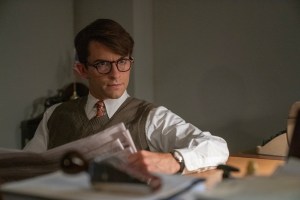
Image Credit: Courtesy of Peter H. Stranks / Showtime Playing decency is usually a thankless task. “Decent” isn’t exactly the stuff of scintillating drama, let alone steamy sex scenes. Luckily, Bailey knows that goodness has nothing to do with either. In “Fellow Travelers,” his Tim is a Catholic politico who struggles to reconcile faith with sexuality and then struggles again to reconcile his romantic nature with his rough-and-tumble sex life alongside the coolly manipulative Hawk. He drinks milk, but he also sucks on toes and, eventually, takes on the Vietnam War draft. Bailey finds the moments of foolhardiness in Tim’s penchant for doing the right thing and also highlights how quickly love can subsume even the noblest of intentions. And then he rages against the dying of the light as a victim of the AIDs epidemic — and the easy forgiveness he suspects Hawk (Matt Bomer) expects from him decades after it could have made a difference. Not to mention one of the most romantic and cringe-worthy serenades since Megan Draper’s “Zou Bisou Bisou.” —Mark Peikert
-
3. Danielle Brooks, “The Color Purple”
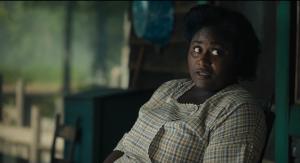
Image Credit: Warner Bros. There’s no star who doesn’t stand out in Blitz Bazawule’s dazzling adaptation of the stage musical of the same name (in turn, an adaptation of Alice Walker’s Pulitzer Prize-winning novel of the same name); after all, this is a film that includes work from (deep breath) Fantasia Barrino, Taraji P. Henson, Colman Domingo, Corey Hawkins, H.E.R., Halle Bailey, David Alan Grier, Elizabeth Marvel, Aunjanue Ellis, Ciara, Jon Batiste, and Louis Gossett, Jr. And yet, even amongst this embarrassment of riches and influx of major talents, Danielle Brooks somehow makes off with the whole thing.
The “Orange Is the New Black” star has always been reliably great, the kind of actress whose name you’ll see in the credits and think, “oh, I love her!,” which makes her work as the absolutely heartbreaking Sofia so dazzling. You love her, and that’s the starting point: you love Sofia when she shows up, all bluster and good cheer, charming Harpo (Hawkins) and baffling his family in turn; you love her when her marriage is blown to bits; you love her when she finds a new direction for her affections; and you really love her when the everyday racism that percolates throughout her adopted small town explodes into a horrifying miscarriage of justice.
And, yes, you love her after, when her Sofia reemerges after a wrenching stint in prison, only to find her light very nearly snuffed out. And yet Brooks maintains the tiniest of sparks through the worst of Sofia’s pain, so that when she finds a way to reignite her larger-than-life personality and charisma, it’s the start of a series of triumphs that impacts everyone in “The Color Purple” forever – including the audience. —Kate Erbland
-
4. Rose Byrne, “Platonic” (and “Physical”)

Image Credit: Courtesy of Paul Sarkis / Apple TV+ Watching a Type A lose control is immediate comedy gold, but Byrne doubles down on her wife and mom letting loose by leaning into the cringe-worthy aspects of acting like a booze-addled college student with her best friend. She puts her husband’s horrible boss in his place, but then eats the speech she’s ripped out of his horrified hands. There isn’t an awkward moment Byrne doesn’t milk nor a dressing down that she doesn’t sink her teeth into. Then a few months later, she returned with the third and final season of “Physical” as another Type A losing and then finally gaining control (though the comedy is distinctly darker). Her Sheila is a self-hating people-pleaser who gradually sheds some of her angry and accommodating ways, culminating in a series finale that finds her in a completely different place than when she was first introduced. The seeds of that transformation, though, were in Byrne’s performance all along. —MP
-
5. Adelaide Clemens, “Justified: City Primeval”

Image Credit: Courtesy of Chuck Hodes / FX Sandy Stanton is not a complicated human being. She likes strong weed, warm vacations, and music you can move to. In a world where they weren’t enemies, she’d happily join Raylan (Timothy Olyphant) on his trips to the ice cream parlor. Instead, Clemens’ character serves drinks at a casino. She’s not particularly good at it, nor does she care. Her priority is on the players. She’s looking for patsies — high rollers who hand over a diamond or the keys to their penthouse instead of 15 percent. That makes her a good partner for Clement Mansell (Boyd Holbrook), a thief and a killer who’s never met a mark unworthy of a hard squeeze.
But even Sandy has her limits. She’s not going to get run over by this man and his greed… it just takes her a little while to realize it. Watching Sandy’s extended awakening could’ve been frustrating or forgettable in the hands of a lesser actor. It’s not a massive arc; she isn’t a changed woman by the end of “City Primeval,” so much as she realizes that her boyfriend is more likely to murder her than run away with her. But Clemens infuses the blonde bimbo archetype with sly humor and practical smarts. She never betrays the show’s nature as a moody, life-or-death crime drama by going too big, and allows her timing, execution, and understanding of each scene to lend Sandy’s comic relief its exclamation mark. In a series filled with elite supporting cast members, Clemens earns her place among the greats. —Ben Travers
-
6. Leonardo DiCaprio, “Killers of the Flower Moon”

Image Credit: Apple A reluctant member of the Tiger Beat hall of fame, Leonardo DiCaprio has never been shy about subverting his movie star image to play low-lifes and scum-bums (especially in recent years, when his roles have included a cartoonishly evil plantation owner and the biggest fraud on Wall Street), but DiCaprio’s nuanced and uncompromising turn as the cretinous Ernest Burkhart mines new wonders from the actor’s long-standing lack of vanity. Embracing his role as a cretinous simpleton who returns to Oklahoma after the end of World War I and immediately becomes involved in his uncle’s murderous plan to bleed oil headrights from the local Osage population, DiCaprio plays Burkhart with the slack-jawed swagger of someone who’s got a limitless supply of moonshine at the start of Prohibition. He delivers every one of his lines directly from the bottom of his sunken jowls, which are forever sunk into the gummy toothlessness of a useful idiot.
But in DiCaprio’s hands, the character blossoms into something complex at the same time as his humanity is sanded away. The more monstrous Burkhart’s actions become, and the tighter his uncle’s leash grows around his neck, the more DiCaprio strains to find a strange kind of sympathy from the spectacle of an oafish, vile man who no longer understands the truth of his own feelings — and is increasingly unwilling to accept the role he played in poisoning his wife and her people. It’s a complex and uncomfortable performance that honors the magnitude of the Osage people’s loss because it so lucidly examines the moral rot of the men responsible for perpetrating it. —DE
-
7. Dominique Fishback, “Swarm”
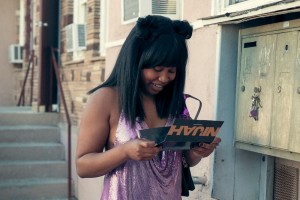
Image Credit: Courtesy of Warrick Page / Prime Video Regardless of one’s feelings for the whole of Prime Video’s provocative series created by “Atlanta” alums Janine Nabers and Donald Glover, Fishback’s talent is undeniable. The breakout from “The Deuce” (and, later, “Judas and the Black Messiah”) hits every note of playing a stan on a murderous rampage with aplomb, making the question, “Who is your favorite artist?” elicit a fight-or-flight response from viewers. In the heavier moments, Fishback is present, so sure of the exact reaction her unpredictable Dre would have to whatever challenges are thrown her way. But the limited series still leaves room for the Brooklyn-born actress to go broad, even slapstick, in a breadth of comedic beats throughout its seven-episode run. —Marcus Jones
-
8. Lily Gladstone, “Killers of the Flower Moon”
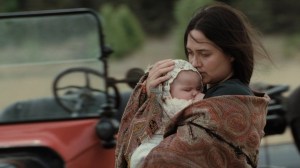
Image Credit: Courtesy of Apple TV+ The central questions of Martin Scorsese’s “Killers of the Flower Moon” all hinge entirely on Lily Gladstone’s work as the real-life Mollie Burkhart: what did she know? When did she know it? Did she love Ernest (Leonardo DiCaprio)? Did he love her? Mostly, really, what did she feel?
Gladstone, beloved by audiences for her breakout role in Kelly Reichardt’s “Certain Women” and her continued excellence in everything from “Billions” to “Reservation Dogs” and “Fancy Dance,” glides into frame in Scorsese’s epic with a bemused detachment that sets up a compelling battle of wills. Gladstone is particularly skilled at holding stillness at the center of her work, and she soon becomes the unmoving center of the film – and Ernest’s tangled desires. But as their relationship moves into more gray territory – just as Mollie’s friends and relatives start showing up dead at a terrifying pace – Gladstone is expected to take on a different, more challenging kind of stillness: mostly bed-bound.
The actress spends the majority of the film’s second half – not including an absolutely gut-wrenching trip to Washington, D.C. that threatens to sap all of Mollie’s remaining strength, and is a wonder to behold – stuck in bed, ill and in deep pain, at the mercy of Ernest, who isn’t making her any better with a cocktail of medicines (and more) designed to keep her stuck, sick, still. Even then, Gladstone remains active, thrilling to watch, fully engaged. She’s the heart of the film, just as Mollie is the soul of this story. —KE
-
9. Ryan Gosling, “Barbie”

Image Credit: Courtesy of Warner Bros. He’s so much more than just Ken. The horse-loving himbo relentlessly accused of running away with Barbie’s summer blockbuster first hit the human world as a paparazzi shot of Ryan Gosling on rollerblades; and nothing in Barbie Land has been the same since.
As imagined by Greta Gerwig and Noah Baumbach for Mattel, the instantly recognizable Beach Expert is a winning combination of arresting platinum, bold textiles, single-minded naivety, and feet-stamping insecurity (the kind that, let’s be honest, can only ever really be manifested by a former Mouseketeer). It’s arguably the funniest film performance of the year, and certainly Gosling’s best comedy. The actor brings an indelible sweetness to the toxically masculine antagonist, wielding his one-way codependence with Malibu’s most iconic blonde as an alarmingly relatable reason to willfully misunderstand the patriarchy.
Gosling takes Ken from supporting punchline to show-stealer with admirable delusional. With two musical numbers (three if you count the cover of Matchbox Twenty’s “Push”), an army of supporting dude bros (shout out to Allan!), and enough fabulous outfits to be flippantly throwing a pair of Celebrate Disco Bell Bottoms out the window of his Mojo Dojo Casa House, Stereotypical Ken made his mark on everything from the “Barbie” soundtrack to 2023 fashion. It’s a part that only could have been pulled off by a handful of A-listers; who else could have us sincerely and warmly saying “Kenough”? But Gosling did it with sublime style. Everyone knows he ad-libbed that scene, right? —Alison Foreman
-
10. Carla Gugino, “The Fall of the House of Usher”
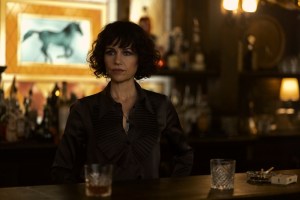
Image Credit: Courtesy of Eike Schroter / Netflix Mike Flanagan mainstay Carla Gugino is the devilish throughline of the horror-maker’s latest Netflix limited series, “The Fall of the House of Usher.” While her character’s name, Verna, may be unsubtly an anagram of “raven” in this Edgar Allan Poe treatment, there’s nothing so knowable about who she is, a shapeshifter of many forms who, one by one, picks off a Sackler-type pharmaceutical dynasty whose sins of the past are prey for her present. The Roderick family empire — whose novel painkiller is now responsible for a new kind of opioid epidemic — situates Flanagan’s gothic horror in “Succession” territory where Verna is now the moral avenger. Neither bird nor human, Verna comes in and out of the series almost like vaper, but with each brutal death, Gugino gets a juicy monologue in which she explains to the Rodericks why they’re getting theirs. The actor transforms into everyone from an unassuming security guard to a homeless intruder, each persona less recognizable than the last. In a performance as physical as it is psychological, Gugino is a terrifying presence, all the more unsettling because of how emotionally flatlined and inhuman she is with each turn. —Ryan Lattanzio
-
11. Glenn Howerton, “Blackberry”
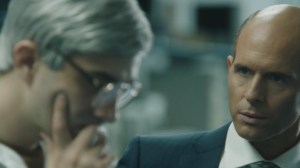
Image Credit: IFC Films I am taking the easy way out on this one, a performance so very good, so totally unexpected, so deeply nuanced, and offering up the best possible summation of its charms: an entire piece from our Ben Travers dedicated to touting its merits and also totally ripping the bizarre choice to chop up “BlackBerry” and Howerton’s work into neat and tidy little episodes. Give the man an Oscar! Or at least give him more roles that remind us, this man needs an Oscar! —KE
-
12. Sandra Hüller, “Anatomy of a Fall”
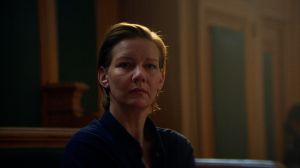
Image Credit: NEON What is she thinking, and what is she thinking? We very often don’t know what’s on the mind of Hüller in Justine Triet’s true crime craze-inspired courtroom drama “Anatomy of a Fall,” the most shattering of marital courtroom dramas. As the messy particulars of her busting-apart marriage to her now-dead (and under mysterious circumstances) husband are exhumed for an audience, Hüller’s novelist is hard to read, which makes the question of just how much she should be implicated in his death all the more chilling. A late-breaking scene sends a firehose of pain gushing out from the knotty heart of their marriage as Sandra accuses him of being a fraud and a phony and responsible for an accident that partially blinded their son. There were two great Hüller performances this year (and really, there should be more of them every year), but here she is sensational, with an undeniable screen presence that should catapult her to huge accolades, a she-is-the-real-deal kind of career-defining performance that is so, so rare. —RL
-
13. Kawennáhere Devery Jacobs, “Reservation Dogs”

Image Credit: Courtesy of Shane Brown / FX It’s only right to see off Sterlin Harjo’s teen coming-of-age comedy by praising all its Young Warriors: Paulina Alexis’s immaculate comic timing as Willie Jack, Lane Factor’s soulful understanding as Cheese, K. Deverey Jacobs’s constantly simmering determination as Elora Danan, and D’Pharaoh Woon-A-Tai’s ability to walk a slackline between mature acceptance and not knowing what the fuck is going on as Bear — but since this list is a hierarchy that enforces European settler-colonial structures of segmenting and rating people, we can only choose one. Jacobs’ performance really is something special, though. This final season of “Reservation Dogs” has asked a lot of her, from Elora dealing with what the next chapter of her life is going to be, to meeting her estranged father, Rick (Ethan Hawke). The interaction between Jacobs and Hawke in “Elora’s Dad,” (the episode was written by Jacobs, too) shows just how assured and precise she is as an actor, able to pull Ethan Hawke (!) up short with a word while still showing us everything that’s going on in Elora’s head. —Sarah Shachat
-
14. Fumino Kimura, “Love Life”

Image Credit: Oscilliscope Heart-wrenching portrayals of grief are a dime a dozen these days, even if modern films seldom hinge on a loss as senseless as the one at the center of Kōji Fukada’s brilliant “Love Life,” in which the heroine’s six-year-old son drowns after falling into a bathtub that she forgot to drain. But Fumino Kimura’s performance as the mother in mourning is ultimately so raw and transcendent because Fukada denies her so many of the beats — and all of the histrionics — that tend to shape dramas like this. Instead of allowing Taeko to be absorbed by her anger, Fukada immediately forces Kimura’s character to bear the weight of everybody else’s feelings, as she’s confronted by her homeless and estranged ex-husband at the same time as her current in-laws threaten to unravel her second marriage. It would be an understatement to say that Kimura is up for the challenge. Withdrawn but never inert, broken but always looking for the cracks where the light might get in (even if it leads her to some very unexpected places), Kimura inhabits Taeko as a woman struggling to determine if the shortest path out of her grief is backwards into her past or forwards into her future, and struggling even more to accept those as her only two options. It’s an unforgettable turn, as light as the reflective shimmer of sunshine bouncing off a CD, and as rooted to the ground as someone dancing alone in a rainstorm. Loss of this kind is hard to find in movies these days, but a performance that convincingly navigates a way through it is that much rarer. —DE
-
15. Greta Lee, “Past Lives”

Image Credit: Courtesy of A24 Prior to her performance in Celine Song’s autobiographical “Past Lives,” Greta Lee was primarily known for her work in comedy series like “Russian Doll” and “New Girl.” And then, in one fell swoop, she revealed herself to be one of the most nuanced and engaging dramatic actresses we have. Holding this ultra-contained epic together across a love story that spans three decades, two continents, and infinite “what might have beens,” Lee is miraculous in the role of a thoughtful, bright-eyed, and tenderly self-divided writer who finds herself torn between the Korean boy she loved as a child in Seoul and the American man she married as an adult in New York.
Whether embodying Nora as a twentysomething MFA student who finds her old flame on Facebook 1.0 with an eagerness that she can’t admit to, or as thirtysomething playwright who’s grieving a part of herself that she’ll never get back, Lee’s miraculous performance cuts to the heart of her character’s hybrid identity with the casual grace of a surgeon operating on a perfect stranger. She uses Nora’s personal confidence and creative ambition as a shield to protect herself from what might have been, which makes the rare moments when she lowers her guard feel almost unbearably vulnerable. The absolute immediacy of Lee’s performance allows you to feel every frame of “Past Lives” on your skin, which is crucial to a film that conveys the brunt of its meaning through sense instead of story. And with every understanding sigh or inviting nod of her head, her character luring the deepest feelings out of the men around her with such exquisite lightness that it almost seems unbearable, Lee is able to find another lifetime of love and longing within the cracks of the only one that Nora will ever get to know. —DE
-
16. Trace Lysette, “Monica”

Image Credit: IFC Films Andrea Pallaoro’s understated and poignant family drama “Monica” features a patient and masterful Trace Lysette as a trans sex worker in Los Angeles shattered by a recent breakup who reconnects with her estranged midwestern mother (Patricia Clarkson), who is dying of brain cancer and only knew her daughter before she transitioned. The film doesn’t ignore but it also doesn’t fixate on Monica’s trans identity, which makes “Monica” perhaps the most unassumingly radical portrait of a trans woman ever put on narrative film. Long a beloved fixture on series like “Transparent,” Lysette gets a chance to truly shine by lending gravitas and even a bit of levity to what could’ve been a heavy role. She draws from her own experiences in the world to mine wells of pain and past resentment and finally compassion that she conveys in a performance that is largely word-free. —RL
-
17. Benoît Magimel, “Pacifiction”
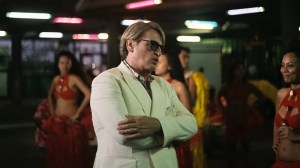
Image Credit: Grasshopper Film With his white suit, flower shirt, and blue-tinted glasses, High Commissioner De Roller has as much a uniform as any character in a movie this year. It’s so obviously a Frenchman’s idea of what to wear on Tahiti, where De Roller has represented the interests of the Republic to the local population for years. But here’s the thing: He actually cares deeply about Tahiti and its people, as much as he pays lip service to colonialism. In Magimel’s hands, De Roller is caught between the perpetually-on-vacation vibe he’s cultivated for years and his deep worry over the possibility that France may begin resuming nuclear tests near inhabited islands – something they did from 1966 to 1996. De Roller’s placid, one might even say “pacific,” demeanor frays as he goes deeper down a Pakula-style rabbit hole centered on a truly deranged French admiral who’s spearheading the nuclear test mission. De Roller is someone who gives a shit, even as much as his cool-breeze exterior suggests otherwise, and, in a way, that connects him to Magimel’s chef in “The Taste of Things,” Dodin Bouffant, a performance that could have made this list as well. But where Dodin is a master of one specific field, as good as anyone could hope to be at the culinary arts, De Roller is spread thin: one moment he’s on a jetski, the next on a plane to another island, the next making small talk over drinks as an icebreaker to discussing matters of life and death. De Roller isn’t very good at his job, and by the time he starts talking about how politics is like a nightclub — all you can do is shout at people — in one extraordinary six-minute monologue, you realize that isn’t entirely his fault. —CB
-
18. Ken Marino, “Party Down” (and “The Other Two”)

Image Credit: Courtesy of Colleen Hayes / Starz During “Party Down’s” long-awaited return season, Ron Donald (Ken Marino) mutters the line, “I’m trapped in a cartoon.” It’s not exactly a joyful statement; the oft-distressed catering company manager isn’t pleased to feel like Wile E. Coyote after the Road Runner tricks him into falling off a cliff. But were this his actual fate, there would be few actors better suited to portray a live-action cartoon than Ken Marino. Charlie Chaplin, perhaps. Maybe Jim Carrey in his prime. But today, right now, I’ll stick with Marino. From his breakthrough in The State through “Party Down” (2009-10), “Children’s Hospital,” “The Other Two,” and back to “Party Down” (2023), the native New Yorker has perfected the art of the pratfall, be it a full body breakdown (like Ron’s masterful bathroom exit in Season 3) or quick but telling expressions that flash across his beleaguered characters’ faces. He can convey utter devastation simply by crinkling his eyebrows, summon cavernous sympathy via a vacant stare, and conjure false confidence with a command any salesman would envy. Watching Marino return to one of his most pliable parts proved to be pure joy. He can provide that, too, even when he’s the saddest Looney Tune you’ll ever hum. —BT
-
19. Ebon Moss-Bachrach, “The Bear”

Image Credit: Courtesy of Chuck Hodes / FX Richie would have had the best season on “The Bear” just for picking up Deep Dish from Pequod’s, and Ebon Moss-Bachrach would deserve special mention simply for embodying the emotional appeal of listening to early era Taylor Swift while driving late at night. But even beyond his stellar work in Episode 7, “Forks,” where we get to really spend time with Richie as he resets and becomes the person who can open the restaurant, Ebon Moss-Bachrach deserves five (Michelin) stars for being able to hold down everything that “The Bear” throws at its entire cast. The stress, the creative struggle, the intense moments of decision, the quiet moments of realization, the profane, fucking perfectly timed comedy: Moss-Bachrach takes us through it all. He is, quite simply, an essential ingredient. —SS
-
20. Ego Nwodim, “Saturday Night Live”

Image Credit: Courtesy of Rosalind O’Connor / NBC Was there a funnier scene this year than the animated repertory player on the long-running NBC sketch series planting her pump onto her dinner seat for more leverage to disorderly saw through her rubbery steak, causing the restaurant table to quake so hard it spills red wine all over a Pedro Pascal who is long past the point of breaking? And “Lisa From Temecula” is but one hilariously strong and wrong characters in Nwodim’s arsenal. After all the departures that came with the previous season, her breakout has exemplified a sea change that leans into simple, delightful silliness after a rough few years trying to impress upon a political landscape that was beyond parody. —MJ
-
21. Maitreyi Ramakrishnan, “Never Have I Ever”
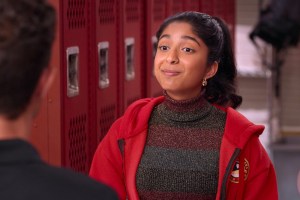
Image Credit: Courtesy Of Netflix Raise a glass for Maitreyi. Over the course of four dramatic, hilarious seasons on the Netflix gem “Never Have I Ever” Ramakrishnan was the bright ball of light at the center. As the teen antihero Devi Vishwakumar, she was equally as adept at the goofy moments (falling through a roof) as the tender stuff (yelling at her mom, having a breakdown in a bathroom) that co-creators Lang Fisher and Mindy Kaling tossed her way. Her chemistry with literally every one of her co-stars made the family and high school stuff feel grounded and real and easy to root for — even when Devi was making yet another wild growing-up mistake.
Coming-of-age stuff can be tricky, but Ramakrishnan’s performance never feels too broad. Instead, she snaps off insults like “Sick necklace, tiny soprano” with apparent ease. We can’t wait to see what she does next. —Erin Strecker
-
22. Franz Rogowski, “Passages”

Image Credit: MUBI Franz Rogowski’s intense and offbeat appeal gets its purest showcase in the despairing polycule of Ira Sachs’ Euro-chic romantic drama “Passages,” in which he plays a solipsistic, stunted filmmaker who strays from his husband Martin (Ben Whishaw) with the tenuous Agathe (Adèle Exarchopoulos). When he tells her he’s in love with her, she says, “You must say that a lot.” Rogowski is a physically striking performer, all the more charming for his just-so-slight lisp, as much as an intellectual and psychological one. Long stretches of Sachs’ movie find Rogowski staring off into space, inscrutable. By the end of the movie after he’s burned down multiple lives, Tomas has ultimately learned nothing and isn’t changing, but it’s the blankness on Rogowski’s face in the final shot that’s all the more compelling for it. What’s he thinking? It might not be much, honestly. You never see the outline of an actor trying to justify this character’s bad behavior, and Rogowski’s oddball appeal makes him a natural fit to play someone you can totally see yourself blowing up your life for. —RL
-
23. Jason Schwartzman, “Asteroid City”
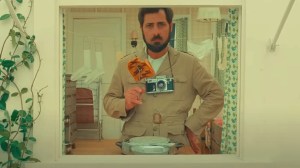
Image Credit: Focus Features As ever, Wes Anderson kits out his latest with the kind of murderer’s row of acting talent that’s so deep, so rich, it’s almost funny. To wit, we’ve got: Scarlett Johansson, Tom Hanks, Jeffrey Wright, Tilda Swinton, Bryan Cranston, Edward Norton, Adrien Brody, Liev Schreiber, Hope Davis, Steve Park, Rupert Friend, Maya Hawke, Steve Carell, Matt Dillon, Hong Chau, Willem Dafoe, Sophia Lillis, Margot Robbie, Tony Revolori, Jake Ryan, Jeff Goldblum, and those are just the topline stars. But all of them orbit around a central performance that holds them in place, that of Anderson regular Jason Schwartzman, cast here as the grieving Augie Steenbeck (and also the actor playing Steenback, Jones Hall).
The big trick of “Asteroid City,” a secretive-ish feature from Anderson that also feels entirely cut from his unique cloth, is not that it’s about (gasp!) aliens or the meaning of “performance” or meta experiences within meta experiences or even the impact of national attention on everyday people or all of that (and more!), but it’s about something much headier and harder: grief. Yes, it’s fun to tidder at Augie as he attempts to tell his pack of kids that their mother is dead (and has been for weeks), but it’s much more rewarding to steadily dive into why he felt the need to keep that secret (even from himself) in the first place.
Schwartzman is as deadpan and funny as ever, but he also suffuses his Augie with a deep pain that’s initially hard to place, and then entirely impossible to forget. He goes through the motions and the steps (even making off with a bit of romance with Johansson’s character that’s equally sexy and sad), all of it leading up to one of the saddest (and most satisfying) scenes to grace an Anderson film and a Schwartzman performance: as Jones (as Augie, sort of), the actor runs into a glowing Robbie, who is here playing Augie’s wife (sort of, she is yet another player playing a role in a greater stage scheme), recounting all of her lines that were cut. Schwartzman is heartbreaking, funny, and true, a man playing a role, a person struggling to live up to a part. —KE
-
24. Emma Stone, “The Curse”

Image Credit: Courtesy of Richard Foreman Jr. / A24 / Paramount+ with Showtime In a year when Emma Stone plays Frankenstein’s monster as a sex-crazed adolescent — and may win an Oscar for her work — it only speaks to the caliber of her acting that “Poor Things” is but one of two all-time performances. The specificity she brings to Whitney Siegel, an aspiring artist and home renovation personality, is spellbinding. So much of her character’s truth is hiding behind a veneer crafted for her Instagram followers, HGTV audience, and the world at large. She always says the right thing, or what’s considered the right thing at the moment, even scripting her husband’s speech, wardrobe, and belief system.
Yet Whitney isn’t defined by superficiality, and the complicated depths we glimpse are a credit to Stone’s lived-in performance as much as director, co-creator, and co-star Nathan Fielder’s peering camera. Lingering a little longer than is comfortable, looking a little harder than Whitney would like, “The Curse” peels back her layers until the contradictions are readily apparent — to viewers and to Whitney herself. Stone incorporates that self-awareness into each scene, discovering parts of Whitney when she doesn’t expect to and then tossing a blanket over them until she feels they’re safe to share (if she ever does). Better still, she’s able to communicate to the audience what’s real, what’s calculated, and what’s somewhere in between. She’s at ease in her character’s incongruence — perfectly comfortable in the discomfort all around her. Stone is the perfect guide through “The Curse,” and even after so many towering previous turns, still a revelation. —BT
-
25. Emma Stone, “Poor Things”
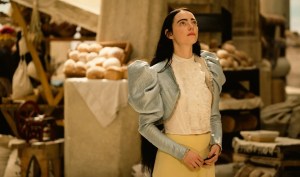
Image Credit: Searchlight “Reanimated Corpse with the Soul of a Horny Infant” is not a cinematic archetype that comes with many preexisting examples, but Emma Stone was able to turn the blank slate of Bella Baxter into the greatest artistic achievement of her career. Few actors possess both the wretched physicality needed to play a Frankenstein’s monster stand-in and the charm to be a femme fatale who trades on her sexuality — but even fewer could merge the two into one coherent character so convincingly.
Structurally, “Poor Things” is a coming-of-age story on meth. Bella is forced to speedrun the majority of a human life in one libidinous odyssey, going from a newborn learning her first words to a child asking countless questions to a teenager with a tendency for knee-jerk rebellion to a lust-filled 20-something within the span of two hours. And that’s before she decides to marry and divorce, has to bury a dead parent, and emerges with a new fleet of pets. Most importantly, she mirrors the audience’s curiosity as her journey of self-discovery guides us through Lanthimos’ bizarre storybook world. Her befuddlement at this society filled with body modifications and posh steampunk cruises gradually morphs to acceptance at the same pace that ours does, allowing the film’s wild imagination to flourish without losing touch with its narrative roots. Bella Baxter might be an invention of Dr. Godwin Baxter, but she’s the most human character in a film that had to paint us a fantasy to remind us of how alive we are. —CZ
-
26. Teyana Taylor, “A Thousand and One”

Image Credit: Focus Features “There’s more to life than fucked-up beginnings,” Inez, a woman living life in New York on her own terms and brilliantly played by R&B super-artist/actress Teyana Taylor, tells her young son Terry (Aaron Kingsley Adetola). She has kidnapped him out of the foster care system, which has kept them separated after her stint in Rikers Island beginning in 1993, and now hopes to give him a better life. But at the end of the movie, after a decades-spanning, bittersweet bond forms and fizzles between them and shattering revelations are had, she tells the older Terry (Josiah Cross), “I fucked up. Life goes on. So what?” It’s lines like these that hit so hard as delivered by Taylor, anchoring A.V. Rockwell’s direction with her powerful work. She’s collaborated with the likes of Tyler Perry in comedies, but it’s her seeming kinship with Rockwell (and Taylor’s own story as a New Yorker) and a performance as fiercely committed to the project as Inez is to Terry that signal a major acting talent. —RL
-
27. Rachel Weisz, “Dead Ringers”
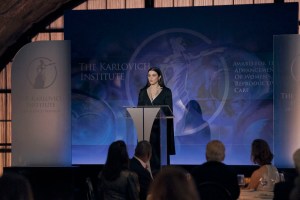
Image Credit: Courtesy of Niko Tavernise / Prime Video To commend Rachel Weisz for playing twins in Prime Video’s spirited adaptation of “Dead Ringers” (first a book, then a movie, now a series!) is simultaneously critical and reductive. To the former point, playing twins means playing two roles, and playing two roles is twice the work of playing the standard one role. That’s just math. Playing two roles as well as Weisz does here, well, that’s getting us closer to the second point.
You see, emphasizing how much an actor works doesn’t really help anyone. What people really want to know is how well the actor performs, which — despite so many awards campaigns stressing the sweaty stress of a candidate’s vote-baiting embodiment — is what the job is all about. As an audience, we don’t just want to watch an actor play a part. We want to be consumed by that actor, as Weisz does here, for nearly every second of the six-hour limited series.
Playing Drs. Beverly and Elliot Mantle, Weisz distinguishes her twin gynecologists without sacrificing the co-dependent relationship that dooms them, or the spooky sister vibes that help set “Dead Ringers’” stirring tone. Beverly is used to Elliot taking command. She speaks in shorter bursts, and carries herself gently, quietly, passively. Elliot, meanwhile, is aggressive. She’s loud, clear, and comfortable in the spotlight. They both have big ideas for revolutionizing women’s health, starting with a better birthing process, but Elliot’s dreams are unrestricted, while Beverly’s are reasonable.
Still, it’s worth studying not only how each sister contrasts each other, but also what happens when they’re together. Like any close-knit siblings, Beverly and Elliiot mirror each other more closely when it’s just the two of them, like they’re borrowing from one another’s aresenal. Such lending helps them imitate the other as called on — like when Beverly lacks the courage to ask out a famous actress she’s crushing on, or when Elliot needs to flatter a benefactor she’s repulsed by — but it also speaks to who they really are, deep down; not one, but two, not alone but united.
They’re twins, yes, but they’re so much more than that — and it’s largely thanks to Weisz. —BT
-
28. Elijah Wood, “Yellowjackets”
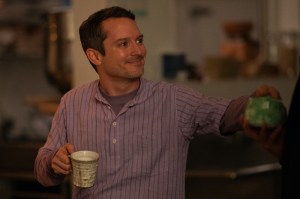
Image Credit: Courtesy of Kailey Schwerman / Showtime To say Christina Ricci ran away with “Yellowjackets” Season 1 would be like saying that soccer team’s plane took a little tumble. Quirky, calculating, and fundamentally batshit, Misty Quigley is a force to be reckoned with after surviving hell in the woods, and finding anyone to hold their own opposite Ricci was going to be tough.
Enter Elijah Wood as Walter Tattersall: one of the most delightfully strange characters of the year.
“PuttingTheSICKinForensics” seeks “AfricanGrey” on a true crime message board, and the unconventional love interests soon warily agree to meet in person. From the instant Wood and Ricci inhabit the same frame (their only collaboration outside of 1997’s “The Ice Storm”), the casting brilliance is clear. “A bored Moriarty looking for his Sherlock,” as he puts it, Walter was decidedly positive in a mixed bag of a season, with the 42-year-old Wood skillfully mining his somehow still boyish charm to appear at once scarily capable and a smidge goofy.
The actor was already a fan of the show and his appreciation for the material shines through every beat. His horror bonafides make the scary scenes work, but Wood’s ability to navigate tight comedy and camp is what really stick in your mind with Walter. He’s certainly a candidate for the best guy on “Yellowjackets” (Caligula notwithstanding), and Wood is undeniably the most lovable TV weirdo of the year. —AF
-
29. Steven Yeun, “Beef”
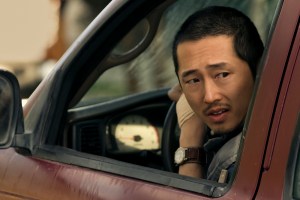
Image Credit: Courtesy of Andrew Cooper / Netflix Danny Cho is at the end of his rope. Steven Yeun’s character in “Beef” is worried about work, worried about supporting his family, worried about all the little things tied to money that make everyday life feel extra exhausting. As a contractor, Danny is already tired out, and you can see it in the way he carries himself — his posture, his gait, his expressions (or lack thereof). He doesn’t need anything more on his plate. What he does need is a release.
Enter the titular beef, initiated by a fairly common bit of road rage that then escalates thanks to each of the primary participants, Danny and Amy (Ali Wong). On Danny’s side, it’s like he needs something simple and pure to focus on, instead of the mess at work (and at home). His crusade is a righteous one because he can only see his side of it. As more and more layers become evident, his anger twists and evolves into something else. Yeun has long proven himself a remarkable performer, who can thrive in subtle, identifiable roles (like his Oscar-nominated turn in “Minari”) and loud, boisterous parts (like his impeccable vocal performance in “Tuca & Bertie). Here, he gets to bring it all together, charting an up-and-down emotional trajectory with raw humanity and thoughtful precision. He’s great in the big scenes (like a teary mid-mass breakdown) and the small ones, drawing us closer and closer to Danny even when he’s getting further and further away from the man he wants to be. —BT
-
30. The “Succession” Cast

Image Credit: HBO Come on! How could we pick just one!? We certainly don’t envy Emmy voters for their tough task ahead — literally every single member of the ensemble was responsible for some of the best TV of the year. The biggest thrill of everyone working at the top of their game was witnessing them playing off each other, whether that be the battle from hell between doomed spouses Tom (Matthew MacFadyen) and Shiv (Sarah Snook), or the dawning horror of assistant Jess (Juliana Canfield) as she witnesses a more-unleashed-than-ever Kendall (Jeremy Strong). And, of course, we’re still thinking about the three siblings’ late-night kitchen scene détente (Kieran Culkin eating cheese is now a core TV memory). All that, and we haven’t even gotten to everyone — particularly James Cromwell — doing their best work at Logan’s “Reagan with tweaks” funeral!
What a delight to witness a whole ensemble make a feast with every line, glare, and “fuck” from Jesse Armstrong and Co.’s biting scripts. Waystar RoyCo may be no more but the insults will live forever. —ES



